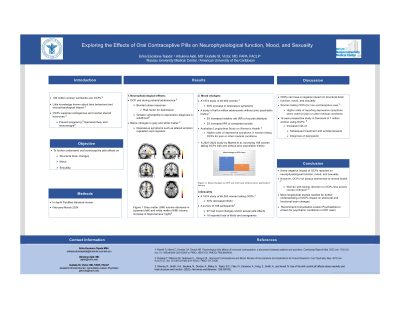Women's Mental Health
(227) Exploring the Effects of Oral Contraceptive Use on Mood, Neurophysiological Function, and Sexuality


Guitelle St. Victor, Md,FAPA,FACLP
Assistant Clinical Director,CL Psychiatry/ Clerkship Director
Nassau University Medical Center
East Meadow, New York
Erika Escalona Tejeda
MS4
American University of the Caribbean
kissimmee, Florida- AA
Albulena Ajeti, MD
Resident
NUMC
Wantagh, New York
Co-Author(s)
Presenting Author(s)
Co-Author(s)
Title: Exploring the Effects of Oral Contraceptive Use on Mood, Neurophysiological Function, and Sexuality
Authors:
Erika Escalona, MSIII
Albulena Ajeti, MD
Guitelle St.Victor, MD, FAPA, FACLP
Introduction
An estimated 100 million women worldwide use combined hormonal oral contraceptive pills (OCPs).1Alternatives to OCPs are long-acting reversible contraceptives and intrauterine devices that emit progesterone locally2. OCPs work by suppressing the endogenous and ovarian steroid hormones in attempt to prevent pregnancy, dysmenorrhea, and menorrhagia.2,3 Despite this wide use of OCPs, little is known about their neurophysiological impact.3 We aim to further understand hormonal contraceptive effects on structural brain changes, mood, and sexuality.
Methods
In depth literature review during February and March of 2024, utilizing PubMed.
Results
Literature reports that OCPs can influence the neurophysiological development of women.3 OCP users demonstrate a blunted stress reactivity response, region-specific increase and decrease in grey matter volume, cortical thickness, and decrease in white matter integrity.3 Additionally, they show differences in brain function during tasks related to memory, reward, and emotion.3 Such structural and functional brain changes may increase the risk of stress-related disorders, particularly depression and anxiety.3
In a study of 78 participants who had a prior psychiatric history, 62.8% reported mood changes as a side effect of OCPs.1 In 1974, a longitudinal study of 46,000 OCP users disclosed 30% increase in depressive symptoms and a decrease in libido.1 A follow-up study of a million adolescents with no prior psychiatric diagnoses, revealed a two-fold increased relative risk of suicide attempts and a three-fold increased relative risk of completed suicide amongst OCP users when compared with non OCP users.1 Additionally, the most common sexual side effects reported were sexual dissatisfaction, loss of libido and anorgasmia.1
Discussion
OCPs can have a negative impact on structural brain function, mood, and sexuality.3 Women taking OCPs for non-contraceptive uses such as pain or other medical conditions, had higher odds of reporting depressive symptoms.2 Additionally, OCP use was found to be associated with an increased risk of antidepressant treatment.2 However, there is controversy about OCP use not being detrimental to mental health.2
Conclusion
Longitudinal studies are crucial in further understanding how OCPs impact structural and functional brain changes as these can lead to depression and anxiety. It is of upmost importance for Consultation-Liaison psychiatrists to screen for these conditions when treating OCP users.
References:
1: Martell S, Marini C, Kondas CA, Deutch AB. Psychological side effects of hormonal contraception: a disconnect between patients and providers. Contracept Reprod Med. 2023 Jan 17;8(1):9. doi: 10.1186/s40834-022-00204-w. PMID: 36647102; PMCID: PMC9842494.
2: Robakis T, Williams KE, Nutkiewicz L, Rasgon NL. Hormonal Contraceptives and Mood: Review of the Literature and Implications for Future Research. Curr Psychiatry Rep. 2019 Jun 6;21(7):57. doi: 10.1007/s11920-019-1034-z. PMID: 31172309.
3: Sharma, R., Smith, S.A., Boukina, N., Dordari, A., Mistry, A., Taylor, B.C., Felix, N., Cameron, A., Fang, Z., Smith, A., and Ismail, N. Use of the birth control pill affects stress reactivity and brain structure and function. (2022). Hormones and Behavior, 124(104783).
Presentation Eligibility: Not previously published or presented.
Diversity, Equity, and Inclusion: By exploring the impact of oral contraceptives on mood, neurophysiological effects, and sexuality, we bring attention to a topic relevant to women from diverse backgrounds, cultures, age groups, and socioeconomic levels. This becomes particularly significant as marginalized groups are more likely to experience depression and anxiety due to poor access to health care. Consequently, this literature review strives to promote better management of mood symptoms among oral contraceptive users.

